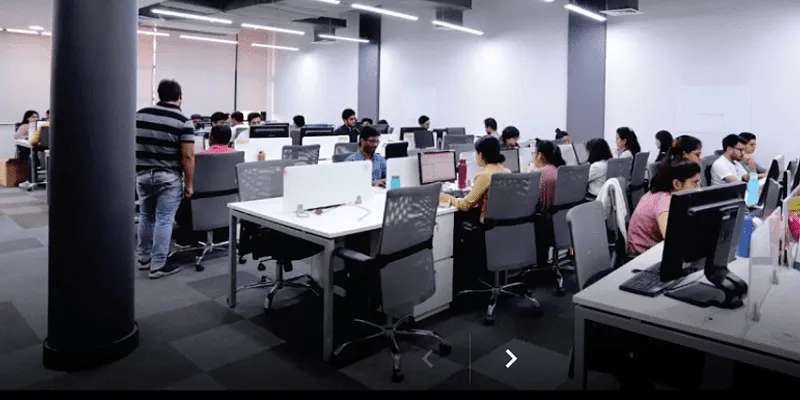With over 2,000 clients, this IP firm helps Indian SMEs lead innovation and compete globally
Started in Gurugram in 2008 by Tarun Kumar Bansal and Anant Kataria, Sagacious IP is making Indian SMEs globally competitive by creating impact across their IP life-cycle.
A biologist by education, BITS Pilani graduate Tarun Kumar Bansal felt there was a lack of awareness of Intellectual Property (IP) among SMEs. Through his experience in the field of IP, research, and technology evaluation, he had seen senior executives reject learning about IP even before trying to understand its basics.
“They felt IP rights are only intended for high-tech companies operating in dynamic fields of R&D, such as consumer electronics and telecommunications. They also thought IP is a legal subject, and not a business subject. Even legal departments didn’t understand its importance, and would care only when they received an infringement notice,” Tarun tells SMBStory in an exclusive interview.

Sagacious IP Co-founder and President Tarun Kumar Bansal
Partnering with Anant Kataria, another IP, research, and development professional, Tarun set out to solve this problem. The two started in 2008, and set up their first office in Gurugram.
Through Sagacious IP, they started creating impact across the IP life-cycle, right from supporting IP strategy formulation, mitigating IP risks, and creating IP to its maintenance and commercialisation and monetisation.
Now, with nine distinct service lines, Sagacious IP has become a prominent service provider in IP research and a partner for many global Fortune 500 companies as well as SMEs. It claims to serve more than 2,000 clients from over 60 countries with more than 12,500 projects.
In an interaction, Tarun describes how Sagacious IP is helping Indian SMEs lead innovation and become globally competitive by understanding and making the most of IP.
Edited excerpts from the interview:
SMBStory [SMBS]: What is the scope of the work undertaken by Sagacious IP?
Tarun Kumar Bansal [TKB]: Over the years, we have been regularly launching new services, products, and platforms to deliver what customers need the most. We added multiple new capabilities, including language capabilities now encompassing over 16 languages helping our global customers use us as a ‘one-stop-shop’.
We built research capabilities encompassing over 120 countries, which lets our customers trust us for global and comprehensive studies. We also built tech capabilities spanning across technologies including AI/ML. Already ahead in the IPTech game, Sagacious IP is progressing well to lead the IPTech space globally in upcoming years.
SMBS: What work do you do for SMEs in India?
TKB: We help Indian SMEs and startups in innovation management processes and assist them in using IP as a business tool. We disseminate 360-degree knowledge to SMEs about setting up innovation engines and creating right IP strategies.
We have also been conducting tailored and free training for senior management as well as R&D and manufacturing staff of many SMEs. Apart from conducting numerous open-to-all sessions, attended by participants from over 100 companies, Sagacious IP delivered one-to-one training to over 30 companies during lockdown when all manufacturing and other activities were shut.
Now, when SMEs are back in operation after lockdown, they are complimenting us for having made their companies more innovative and IP-ready.
During these training sessions and interactions with the senior management, we also realised that not all SMEs have the resources to get full time IP staff and they wanted some other reliable solution.
Keeping this in mind, we launched a Virtual Innovation and IP Consultation Platform that can be used by SMEs as their outsourced IP department for free/paid consultations. They can also get access to a lot of training content around IP, made available in multiple Indian languages.

The Sagacious IP office
SMBS: What is the Virtual Innovation and IP Counsel Platform? How does it work?
TKB: In the present scenario, many SMEs and R&D institutes rely on their in-house R&D experts or legal counsels, who may not understand IP strategy well, for IP-related decisions. This can result in lost opportunities to file the necessary IP, either due to lack of know-how or due to unavailability of an IP expert in-house.
This creates a risk to business. A timely online consultation with right IP experts via our platform can prevent such situations. Thus the Virtual IP Counsel Platform is an online consulting platform to provide reliable and timely IP support to SMEs who have none or limited full-time IP professionals in-house.
Depending on the needs of the SME, the platform provides access to senior IP strategy experts, tools and patent information to all the staff in their SME. This way, the overall innovation and IP processes are improved and anyone from their organisation can reach out and talk to IP/innovation experts.
The tool further houses numerous easy to understand training modules, designed specifically for people not aware of IP. They have a wide reach, meaning it is useful for all staff, including manufacturing, R&D, executives, supervisors, etc.
SMBS: What is the process for using the platform?
TKB: Presently, the platform can be accessed by organisations that are a part of an association or group. This helps the associations add strategic value to their members. Users can register online through an easy-to-use platform and raise any of their IP/innovation-related queries.
These queries are assigned to relevant technology and IP experts at Sagacious IP and get answered within two working days. With a team of over 350 techno-legal professionals having global IP experience and a network of more than 5,000 external experts, we are confident of providing the aptest answers and solutions to these queries.
The Virtual IP Counsel platform also has a Meeting Scheduler wherein the user can request for a meeting with an IP expert to discuss and elaborate their query/requirement. Additionally, the Electronic Learning Module contains videos of IP-related training and webinars to enhance user’s IP awareness.
SMBS: How does helping Indian SMEs with IP boost their global competitiveness?
TKB: We follow a multi-faceted approach to make sure Indian firms take advantage of growth in the global tech space. Sagacious IP identifies technical features from global patents that have not been protected in India and thus are free for use in India. This takes care of any patent infringement, which is very critical.
We meet with the management and product teams of the SME to identify features that have the least effort-expense to reduce into practice. We then help the team build those features, leading to an end-product that is a competitive offering for the market

Snapshot of Sagacious' Virtual Innovation and IP Platform
SMBS: Once SMEs agree to allocate resources to IP, what challenges do you face in implementation?
TKB: We have identified that inventors in India are not trained to capture IP at its origin. They often fail to identify great inventions during their research and end up losing valuable IP. We have also seen that many SMEs in India lack a framework for managing innovation. This has often led to divulgence of business and technology secrets
Further, due to a lack of awareness, we have seen that SMEs make bad choices while selecting their IP vendor and look for cost only. This leads to poor protection and other intangible losses.
Another hands-on challenge we have identified involves employment contracts that don’t have any IP clause to specify who will own the IP rights if invented during their employment using resources of the firm. The staff may also lack motivation and there is no incentive framework for them to create IP and devote time to IP related things.
They always say they have a lot of work to do, the IP process is complicated and doesn’t align with KPIs, and they have no time for writing invention disclosures.
An exception to these is the life-sciences domain, where organisations are relatively more aware than other sectors. Further, a lot of ICT based businesses (including startups) are now realising the importance of IP. With government aid and support, they are increasingly filing IP. But all other industries still find IP far-fetched.
SMBS: How did COVID-19 affect the business and what are your future plans?
TKB: COVID-19 has strongly impacted businesses in India, but we have seen an increase in inquisitiveness from SMEs towards IP. They have started reading about and understanding IP.
Some sectors like pharma, medicine, and telecom that are already aware of the importance of IP were quite active since the outbreak. Other businesses like e-learning, e-commerce etc., picked up pace and are now investing in IP.
From the KPO industry, we experienced a brief lull in business from the Indian side. Our SME clients paused projects, but CoEs (centre of excellence) of MNCs, and large corporations resumed work after a brief pause.
We are getting regular requests for patent analytics, drafting, and filing applications globally. Further, as expected, our work on the litigation support side has increased a lot as companies are trying to make up for the lost revenues from the market by enforcing their patents to collect royalties and damages.
As we want to continue evolving with the changing needs of customers, we have partnered with many AI and NLP organisations. We are collaboratively creating tools and platforms for making IP analytics smarter and faster. We also created a ‘Customer Advisory Board’ which focusses on improving these tools through customer feedback and suggestions.
Going forward, we envision our platform to become an indispensable part of associations and organisations.
Edited by Saheli Sen Gupta










